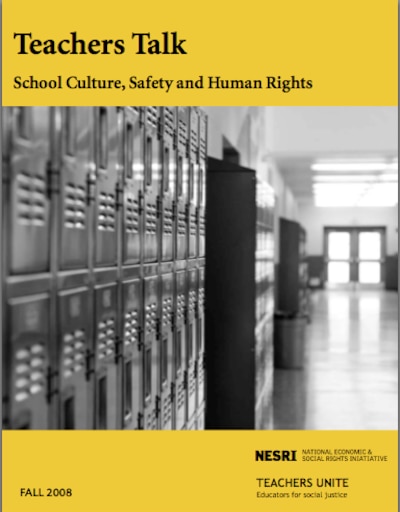
A year ago, the human rights-oriented nonprofit National Economic and Social Rights Initiative released a report accusing the city’s Department of Education of “degrading treatment and abusive policing” in its schools.
Now, NESRI has teamed up with Teachers Unite, a New York City group that emphasizes social justice in education, to showcase the teachers’ perspective on school discipline. The report, titled, “Teachers Talk: School Culture, Safety, and Human Rights,” draws on focus groups, individual interviews, and an online survey of more than 300 teachers in 136 schools.
The bottom line, teachers say, is punitive discipline doesn’t actually help make schools safer.
From the report:
What happens when you ask teachers in New York City public schools how to make schools safe? Not surprisingly, they talk about creating positive school cultures built on caring relationships, a commitment to learning, and the teaching of skills to prevent and resolve conflict. Teachers also reflect a keen understanding that all members of the school community need to come together to develop a comprehensive plan for discipline with clear rules and consequences that are implemented consistently and fairly. This holistic approach to school discipline and safety is supported by research which shows that positive environments and constructive interventions with participation from all stakeholders are the most effective means for improving safety and reducing disciplinary incidents. This also reflects a human rights-based approach to discipline which requires that school environments protect the inherent dignity of the child, and that education be aimed at the full academic, social, and emotional development of children.
The report concludes with “action steps” for the mayor and DOE to take, including supporting the Student Safety Act, currently before the City Council; clarifying the division of authority between DOE and NYPD in maintaining discipline; and introducing peer mediation, counseling, and conflict resolution programs in schools.
